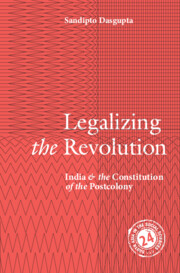Book contents
7 - Property and Labour
Published online by Cambridge University Press: 07 May 2024
Summary
Landlord of England art thou now, not king,
Thy state of law is bondslave to the law.
—William Shakespeare, Richard IILand is like ivies. It requires the might of the stick to maintain and grow. Everything else comes after. Comes on their own. Even the law.
—Satinath Bhaduri, Dhorai Charit ManasThe way this question is being dealt with may appear to them not completely right so far as they are concerned – but it is a better way and a juster way, from their point of view, than any other way that is going to come later. That way may not be by any process of legislation. The land question may be settled differently.
—Jawaharlal Nehru, Constitutional Assembly Debates, 10 September 1949In 1935, in the midst of the global depression, W. E. B. Du Bois published Black Reconstruction in America. The purpose of the book was to challenge the dominant narrative on the failures of the post-Civil War reconstruction in the American South. But the book was concerned with a failure on a larger scale – of democracy in America. At an even larger scale, the arguments of the book foreshadowed the challenges for the not-yet-born democracies in the still colonized peripheries. For Du Bois, the end of the Civil War and the initial years of the Reconstruction offered a singular chance for the realization of democracy in America. The first step towards this was franchise for the formerly enslaved (male) black workers. The next step, Du Bois argued, had to be a proper redistribution of land to those workers. After all, he noted, ‘their demand for a reasonable part of the land on which they had worked for a quarter of a millennium was absolutely justified’. Ownership of some property that ensured their subsistence was the only thing that could prevent the formerly enslaved from being forced back into a relationship of dependence on and subservience to the very plantations they had been emancipated from. It was not only just, but also necessary. Universal franchise could not survive, Du Bois wrote, ‘without personal freedom, land, and education’. Thus arose the demand for 40 acres of land for emancipated black workers.
- Type
- Chapter
- Information
- Legalizing the RevolutionIndia and the Constitution of the Postcolony, pp. 232 - 269Publisher: Cambridge University PressPrint publication year: 2024

